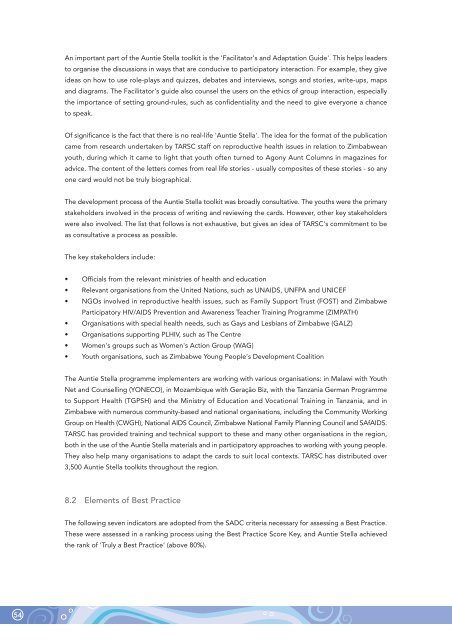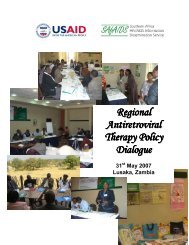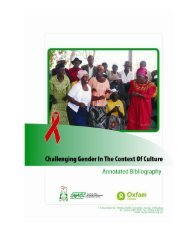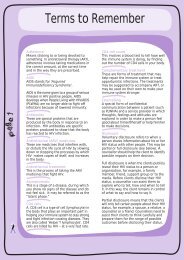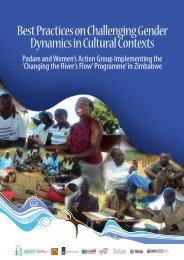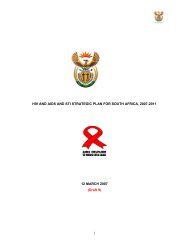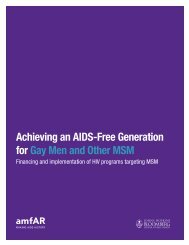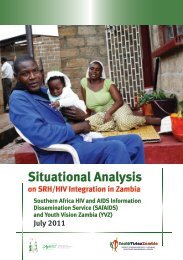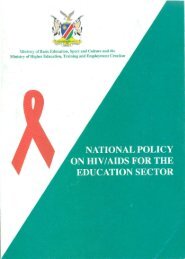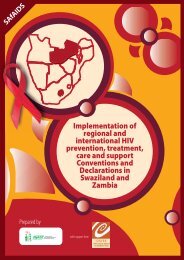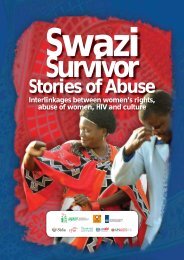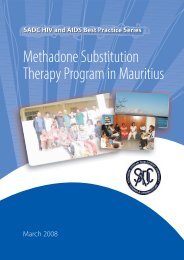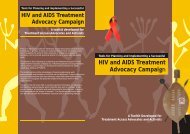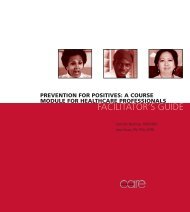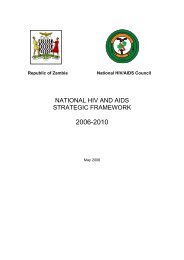Zimbabwean stories of "Best Practice" - SAfAIDS
Zimbabwean stories of "Best Practice" - SAfAIDS
Zimbabwean stories of "Best Practice" - SAfAIDS
Create successful ePaper yourself
Turn your PDF publications into a flip-book with our unique Google optimized e-Paper software.
An important part <strong>of</strong> the Auntie Stella toolkit is the 'Facilitator's and Adaptation Guide'. This helps leadersto organise the discussions in ways that are conducive to participatory interaction. For example, they giveideas on how to use role-plays and quizzes, debates and interviews, songs and <strong>stories</strong>, write-ups, mapsand diagrams. The Facilitator's guide also counsel the users on the ethics <strong>of</strong> group interaction, especiallythe importance <strong>of</strong> setting ground-rules, such as confidentiality and the need to give everyone a chanceto speak.Of significance is the fact that there is no real-life 'Auntie Stella'. The idea for the format <strong>of</strong> the publicationcame from research undertaken by TARSC staff on reproductive health issues in relation to <strong>Zimbabwean</strong>youth, during which it came to light that youth <strong>of</strong>ten turned to Agony Aunt Columns in magazines foradvice. The content <strong>of</strong> the letters comes from real life <strong>stories</strong> - usually composites <strong>of</strong> these <strong>stories</strong> - so anyone card would not be truly biographical.The development process <strong>of</strong> the Auntie Stella toolkit was broadly consultative. The youths were the primarystakeholders involved in the process <strong>of</strong> writing and reviewing the cards. However, other key stakeholderswere also involved. The list that follows is not exhaustive, but gives an idea <strong>of</strong> TARSC's commitment to beas consultative a process as possible.The key stakeholders include:• Officials from the relevant ministries <strong>of</strong> health and education• Relevant organisations from the United Nations, such as UNAIDS, UNFPA and UNICEF• NGOs involved in reproductive health issues, such as Family Support Trust (FOST) and ZimbabweParticipatory HIV/AIDS Prevention and Awareness Teacher Training Programme (ZIMPATH)• Organisations with special health needs, such as Gays and Lesbians <strong>of</strong> Zimbabwe (GALZ)• Organisations supporting PLHIV, such as The Centre• Women's groups such as Women's Action Group (WAG)• Youth organisations, such as Zimbabwe Young People's Development CoalitionThe Auntie Stella programme implementers are working with various organisations: in Malawi with YouthNet and Counselling (YONECO), in Mozambique with Geração Biz, with the Tanzania German Programmeto Support Health (TGPSH) and the Ministry <strong>of</strong> Education and Vocational Training in Tanzania, and inZimbabwe with numerous community-based and national organisations, including the Community WorkingGroup on Health (CWGH), National AIDS Council, Zimbabwe National Family Planning Council and <strong>SAfAIDS</strong>.TARSC has provided training and technical support to these and many other organisations in the region,both in the use <strong>of</strong> the Auntie Stella materials and in participatory approaches to working with young people.They also help many organisations to adapt the cards to suit local contexts. TARSC has distributed over3,500 Auntie Stella toolkits throughout the region.8.2 Elements <strong>of</strong> <strong>Best</strong> PracticeThe following seven indicators are adopted from the SADC criteria necessary for assessing a <strong>Best</strong> Practice.These were assessed in a ranking process using the <strong>Best</strong> Practice Score Key, and Auntie Stella achievedthe rank <strong>of</strong> 'Truly a <strong>Best</strong> Practice' (above 80%).54


